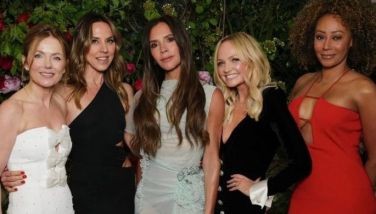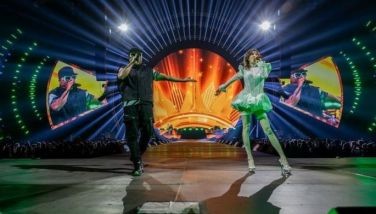Lord of the Oscars?
January 25, 2004 | 12:00am
Let me preface this review by saying I am not in any way, shape or form a huge Tolkien fan or "LOTR" geek. I sat through the previous two Lord of the Rings films with an open mind, and on the whole found them to be better than the average Hollywood action film – especially viewed next to George Lucas’s hollow and wooden Star Wars prequels. The trick was Peter Jackson, a director with a wide, imaginative brushstroke, a bag full of visual tricks and deep reserves of wit (check out his early Bad Taste or Heavenly Creatures for a clue that you’re not dealing with the average Hollywood director-for hire).
Still, I was not salivating at the prospect of sitting through a 3 1/2-hour wrap-up to the Rings trilogy. But there you have it: despite its daunting length, Return of the King still manages to kick much Hollywood factory-filmmaking ass, and Jackson definitely deserves a Best Director Oscar – or a Technical Knighthood, a Boy Scout Merit Badge, something – for bringing this trilogy home with his, and its, dignity solidly intact.
In this day and age of disappointing movie trilogies (Matrix sequels, anyone?), Jackson’s Lord of the Rings at least had the sense to stick close to Tolkien’s text, a rich tapestry of literary invention, timeless metaphor and moral authority. The books are "about" something, in a way the Harry Potter books, for instance, have yet to achieve. In a word, Tolkien’s fantasy is about the need for fellowship: the importance of relying on others and helping others, be they humans, elves, dwarves, hobbits or talking trees. Underlying the three films – and equally important in this finale – is an ecological message that spreads up and down the food chain: without a deep, symbiotic relationship with other beings on this planet, there is only doom and destruction.
This message is brought home fantastically by Jackson, though without a great deal of flag-waving or speechmaking (there is one great speech by Aragorn – played by the perpetually-stubbled Viggo Mortensen – which rivals Mel Gibson’s in Braveheart, if only because it’s shorter). Wisely, this third chapter sweeps back and forth from large-scale action sequences down to face-to-face character interaction with nothing lost: in fact, it’s the ties between Aragorn and Legolas, Gandalf and Pippin, and most of all Sam and Frodo which people will remember long after the clangs and thuds of battle scenes have stopped ringing in their ears.
And yet, the film would lose a great deal without the presence of a single computer-generated character: the loathsome but pathetic Gollum (acted out by Andy Serkis, then rendered lifelike by a team of computer animators). Gollum represents all the struggles Frodo and his colleagues encounter in their mission: temptation, fear, corruption, the promise of redemption and restored loyalty. With his withered skull, larval appearance and endless treachery, Gollum shows what happens to those who cling to material possessions and lose all spiritual connection in the process. In a phrase: loss of fellowship.
Of course, the bond between Frodo (Elijah Wood) and Sam (Sean Astin) lends the most "human" dimension to this fantasy of hobbits and Middle-Earth dwellers. Disregarding the gay subtext underlying all the male relationships in Return of the King (after all, what buddy action movie doesn’t reek of gay subtext?), Wood’s and Astin’s acting are up to the challenges of this finale, taking them to the realm of Mordor and the edge of Mount Doom.
Except for one notable exception – Miranda Otto’s Eowyn, who joins her uncle’s men on the battlefield – women play a smallish part in this third chapter: Galadriel (Cate Blanchett) and Arwen (Liv Tyler) stand off on the sidelines while the men amass, clank swords, and prepare to protect the gates of Gondor against an approaching army of Orcs, Oliphaunts, and Nazgul. The battle scenes are brutal and vicious, better than Monday Night Football, and more crushing than the previous Two Towers chapter. Granted, some plays seem lifted directly from The Empire Strikes Back, but there is room enough for playful movie allusion in Jackson’s broad canvas. (Check out, for instance, Frodo’s final bedside scene surrounded by his pals, which is pure Wizard of Oz.)
Certain sequences stand out, not just as fantasy elements or special-effects extravaganzas, but simply as great movie-making. To wit, the lighting of the beacons across the hills of Gondor, calling armies across the land to defend the kingdom: this is a simple sequence, hardly any special effects involved at all, but it’s breathtaking. Then there is the scene intercutting Pippin, who is asked to sing a song for the dining steward of Gondor, while his son Faramir (David Wenham) rides off to certain disaster on the battlefield. Francis Ford Coppola’s The Godfather has nothing on Jackson’s use of montage here.
True, there is a surplus of endings to Return of the King. Just when you think you’re about to leave The Shire for good – no, there’s another Hobbit smoking a pipe, grinning over his memories and adventures. One senses Peter Jackson wanted to close the back cover of this book very slowly and deliberately, giving everyone a final look back. Still, 15 minutes could easily have been shaved off.
And while quibbling, a question does arise about Frodo and Sam, sitting a mountaintop away from their final destination. They choose to descend through a valley of nasty Orcs, despite the presence of Gandalf’s handy hawks. Couldn’t those hawks have airlifted the two Hobbits to their destination instead?
But when all is said and done, Jackson deserves a Best Director award for his collective work on the trilogy, even if it is only a nod to his technical wizardry. He has earned his acclaim for assembling a believable world here (the closing credits list all the extras by name, and the list seems to go into the thousands), a world that not only hews closely to the Tolkien text but breathes new life into its story, something movie adaptations are supposed to do, but often don’t. Sure, it’s a fantasy world, something Oscar voters aren’t supposed to take seriously. But Lord of the Rings is no more a fantasy than, say, Titanic was. And that won Best Picture, if you’ll recall.
Still, I was not salivating at the prospect of sitting through a 3 1/2-hour wrap-up to the Rings trilogy. But there you have it: despite its daunting length, Return of the King still manages to kick much Hollywood factory-filmmaking ass, and Jackson definitely deserves a Best Director Oscar – or a Technical Knighthood, a Boy Scout Merit Badge, something – for bringing this trilogy home with his, and its, dignity solidly intact.
In this day and age of disappointing movie trilogies (Matrix sequels, anyone?), Jackson’s Lord of the Rings at least had the sense to stick close to Tolkien’s text, a rich tapestry of literary invention, timeless metaphor and moral authority. The books are "about" something, in a way the Harry Potter books, for instance, have yet to achieve. In a word, Tolkien’s fantasy is about the need for fellowship: the importance of relying on others and helping others, be they humans, elves, dwarves, hobbits or talking trees. Underlying the three films – and equally important in this finale – is an ecological message that spreads up and down the food chain: without a deep, symbiotic relationship with other beings on this planet, there is only doom and destruction.
This message is brought home fantastically by Jackson, though without a great deal of flag-waving or speechmaking (there is one great speech by Aragorn – played by the perpetually-stubbled Viggo Mortensen – which rivals Mel Gibson’s in Braveheart, if only because it’s shorter). Wisely, this third chapter sweeps back and forth from large-scale action sequences down to face-to-face character interaction with nothing lost: in fact, it’s the ties between Aragorn and Legolas, Gandalf and Pippin, and most of all Sam and Frodo which people will remember long after the clangs and thuds of battle scenes have stopped ringing in their ears.
And yet, the film would lose a great deal without the presence of a single computer-generated character: the loathsome but pathetic Gollum (acted out by Andy Serkis, then rendered lifelike by a team of computer animators). Gollum represents all the struggles Frodo and his colleagues encounter in their mission: temptation, fear, corruption, the promise of redemption and restored loyalty. With his withered skull, larval appearance and endless treachery, Gollum shows what happens to those who cling to material possessions and lose all spiritual connection in the process. In a phrase: loss of fellowship.
Of course, the bond between Frodo (Elijah Wood) and Sam (Sean Astin) lends the most "human" dimension to this fantasy of hobbits and Middle-Earth dwellers. Disregarding the gay subtext underlying all the male relationships in Return of the King (after all, what buddy action movie doesn’t reek of gay subtext?), Wood’s and Astin’s acting are up to the challenges of this finale, taking them to the realm of Mordor and the edge of Mount Doom.
Except for one notable exception – Miranda Otto’s Eowyn, who joins her uncle’s men on the battlefield – women play a smallish part in this third chapter: Galadriel (Cate Blanchett) and Arwen (Liv Tyler) stand off on the sidelines while the men amass, clank swords, and prepare to protect the gates of Gondor against an approaching army of Orcs, Oliphaunts, and Nazgul. The battle scenes are brutal and vicious, better than Monday Night Football, and more crushing than the previous Two Towers chapter. Granted, some plays seem lifted directly from The Empire Strikes Back, but there is room enough for playful movie allusion in Jackson’s broad canvas. (Check out, for instance, Frodo’s final bedside scene surrounded by his pals, which is pure Wizard of Oz.)
Certain sequences stand out, not just as fantasy elements or special-effects extravaganzas, but simply as great movie-making. To wit, the lighting of the beacons across the hills of Gondor, calling armies across the land to defend the kingdom: this is a simple sequence, hardly any special effects involved at all, but it’s breathtaking. Then there is the scene intercutting Pippin, who is asked to sing a song for the dining steward of Gondor, while his son Faramir (David Wenham) rides off to certain disaster on the battlefield. Francis Ford Coppola’s The Godfather has nothing on Jackson’s use of montage here.
True, there is a surplus of endings to Return of the King. Just when you think you’re about to leave The Shire for good – no, there’s another Hobbit smoking a pipe, grinning over his memories and adventures. One senses Peter Jackson wanted to close the back cover of this book very slowly and deliberately, giving everyone a final look back. Still, 15 minutes could easily have been shaved off.
And while quibbling, a question does arise about Frodo and Sam, sitting a mountaintop away from their final destination. They choose to descend through a valley of nasty Orcs, despite the presence of Gandalf’s handy hawks. Couldn’t those hawks have airlifted the two Hobbits to their destination instead?
But when all is said and done, Jackson deserves a Best Director award for his collective work on the trilogy, even if it is only a nod to his technical wizardry. He has earned his acclaim for assembling a believable world here (the closing credits list all the extras by name, and the list seems to go into the thousands), a world that not only hews closely to the Tolkien text but breathes new life into its story, something movie adaptations are supposed to do, but often don’t. Sure, it’s a fantasy world, something Oscar voters aren’t supposed to take seriously. But Lord of the Rings is no more a fantasy than, say, Titanic was. And that won Best Picture, if you’ll recall.
BrandSpace Articles
<
>
- Latest
- Trending
Trending
Latest
Trending
Latest
Recommended
































